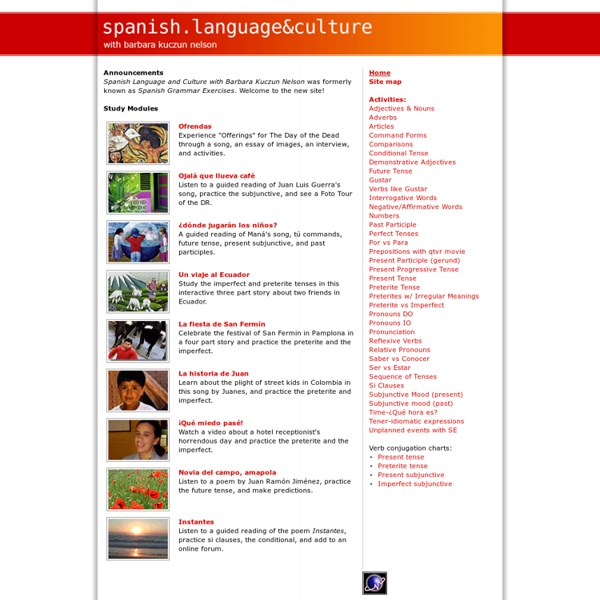Talking about the weather & seasons in Spanish (conversations + quiz)
Do you know how to say the seasons in Spanish and how to use simple expressions and questions to talk about the weather in Spanish? This lesson is an extension to our lesson about weather descriptions and forecasts, but adding a few interesting conversations about the weather in Spanish (EL CLIMA) and more chances to practice Spanish listening. We also include a nice video showing the seasons in Spanish – Las estaciones del año. Comencemos… How to write and say the seasons in Spanish – Las estaciones del año
English-Spanish Vocabulary Quizzes
<CENTER><a href=" English-Spanish Vocabulary Quizzes Quizzes to Help You Learn and Review Vocabulary This is a part of The Internet TESL Journal's Activities for ESL Students
Spanish Language Exercises
Welcome to the Spanish Language Exercises web page, hosted by Ursinus College. This site presents a series of language exercises for the purpose of facilitating the learning and teaching of Spanish in the Internet environment. These exercises were born out of the need to incorporate new materials into my teaching practices and because of my curiosity about the emergence and popularity of new technologies. Rather than presenting here a comprehensive display of grammar exercises, I offer examples of different approaches to common language challenges for the foreign student of Spanish. My intention is, thus, to share ideas with instructors and students alike, leaving to the former the pedagogical decisions of how to better utilize these exercises, and hoping that the latter will really benefit from this hypertextual experience.
Describing the weather in Spanish & making weather forecasts (expressions)
Do you how to talk about the weather in Spanish? It is always good to be able to say how we feel about the EL CLIMA (the weather) or EL TIEMPO in a place. The weather is a very common conversation topic anywhere. In this Spanish lesson you will learn some ways to ask about the weather in Spanish and how to describe it using some common weather expressions.
Spanish verb conjugation
Spanish is a Romance language that developed from the Latin language. There are 340 milion native speakers. It is spoken on the whole American continent in addition to the Iberian peninsula in Europe. Spanish verbs are conjugated in four moods, four simple tenses, and in six persons. Most verbs are conjugated regulary in one of the three conjugations. There is however a significant number of irregular verbs...
videos españoles con subtítulos españoles
This is the Holy Grail for Spanish-learners: videos (movies, TV shows, whatever) in Spanish and with Spanish (not English) subtitles, or an exact transcript in Spanish of what was said (the two are basically the same). Why are Spanish subtitles so important? Because, as someone learning Spanish, you can’t understand everything they’re saying and if you can’t understand what they said, and you don’t have it written down in front of you, then you can’t look it up to learn it–English subtitles might give you a clue as to what was said, but Spanish subtitles would be best since they’re a word-for-word transcription. You need to know the specific words that were said, you need to know what was said word-for-word, not just what was meant, so you can look it up. I get that. , I love that movie).
Tales from a Spanish Teacher: Phrase of the Week
Frase de la semana! I took this idea, once again, from the Creative Language Class. Each week my students get a phrase.



